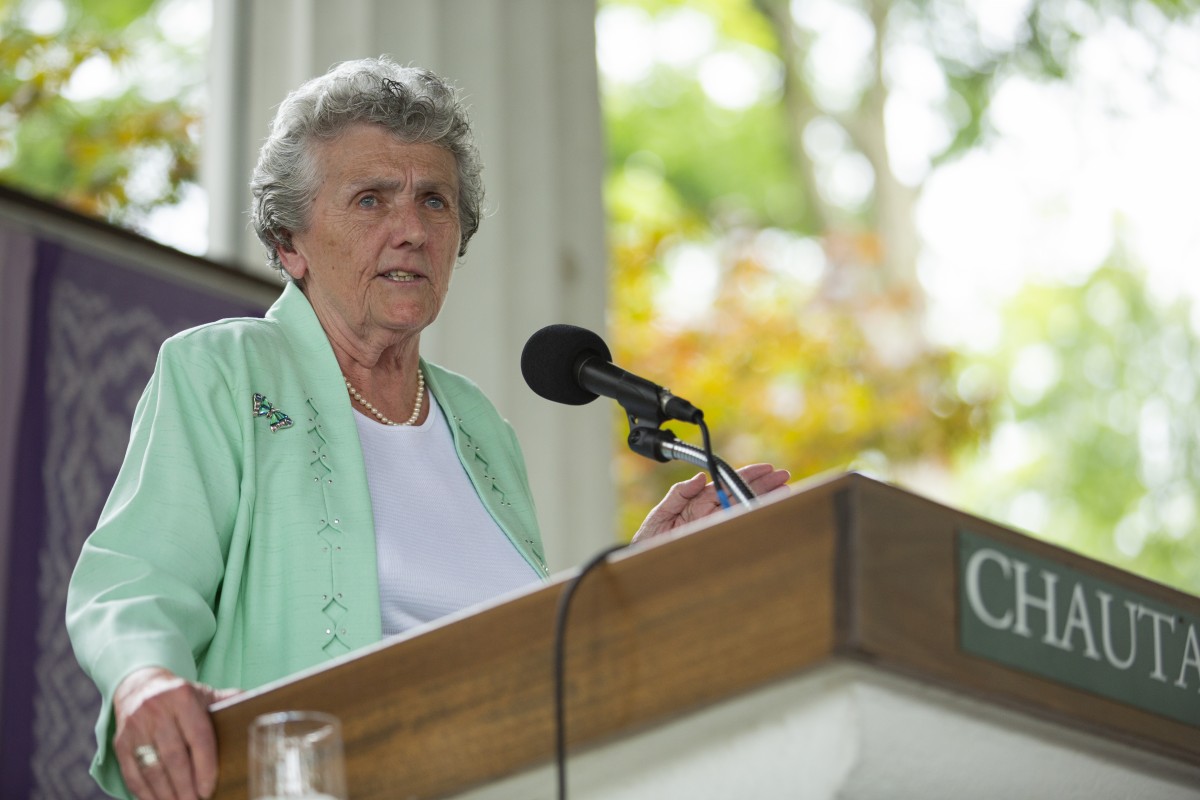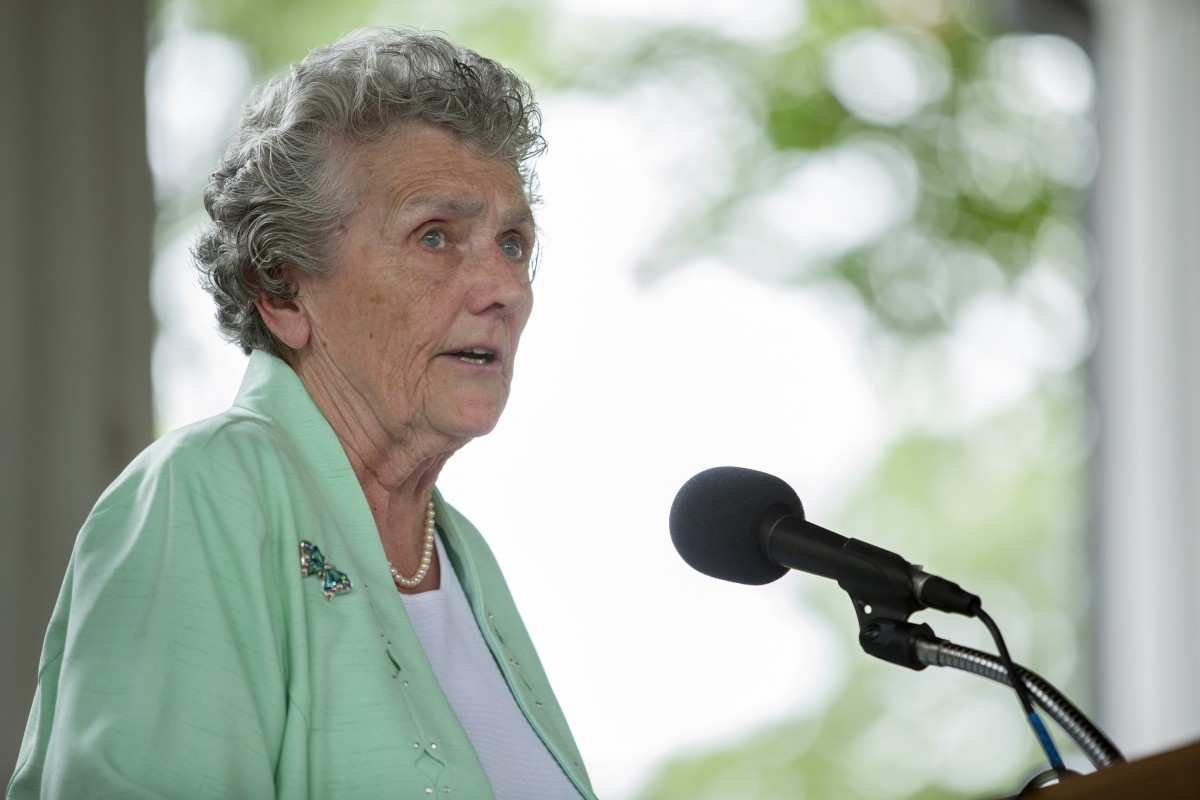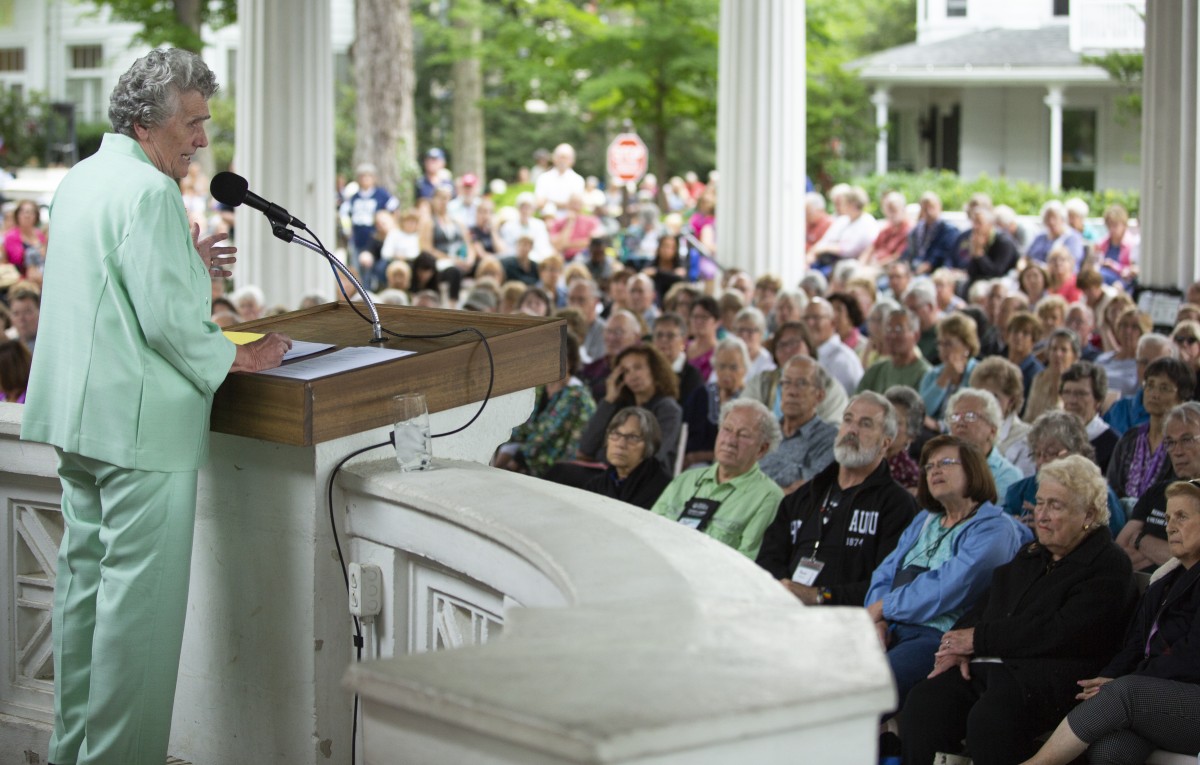Joan Chittister believes every major institution in American society, including marriage, family, government, education, work and church, is in a “state of turmoil, breakdown, division and decline.”
However, she has a game plan to turn things around: a list of 12 principles from a sixth-century saint she thinks has the potential to save humankind from itself.
At 2 p.m. Monday, July 30, in the Hall of Philosophy, Chittister, a Benedictine Sister and women’s rights activist, gave her lecture, “The Spirituality of Relationship: A New Paradigm for Work,” as part of Week Six’s interfaith theme, “A Spirituality of Work.”
“Our world, the United States, is tilting and turning in ways we never thought possible,” she said. “The headlines in our daily papers are a cacophony of rage and violence, of control and power plays, of personal insult and class competition. What ever happened to the heart of it?”
Chittister said the “torturous twist of American ideals” has been occurring for generations and began with the Enlightenment movement of the 18th century.
“With its emphasis on human reason as its primary source of authority, (the Enlightenment) undermined both the divine right of kings and the absolutism of church law,” she said. “Those were surely good things, (but) they were also surely dangerous ones.”
The Enlightenment swept across Europe and affected six major countries: France, Germany, England, Russia, Italy and then the United States.
“Each of them absorbed it in different ways,” Chittister said. “The American response was the (creation of the) Constitution of the United States and its emphasis on individual rights and democratic participation.”
The glorification of individual rationality began in 1784 when philosopher Immanuel Kant wrote an essay titled “Answering the Question: What Is Enlightenment?”
“He put in one searing sentence the essence of the movement when he wrote, ‘dare to know and have courage to use your own reason,’ ” Chittister said.
Chittister believes people began to embrace their individuality, which caused a “revolt against meaningful philosophy.” This sparked feelings of uncertainty in regard to religion.
“While elements in the laboratory and galaxies in space made even the concept of God uncertain, if not actually suspect, there was no unity of faith left, no certainty of belief, no common commitment to just about anything,” Chittister said. “Everything, everything was up for grabs now.”
Chittister said the emphasis on scientific achievement led Americans to concentrate solely on the concept of “the self.”
In the early 19th century, Georg Wilhelm Friedrich Hegel defined self as the“life and death struggle with the other,” Chittister said.
“He argued, in other words, that the self is ‘will and power in contest with the will and power in others,’” she said. “So the eternal war for personal preeminence begins.”
The war for personal preeminence was the beginning of the narcissism epidemic, Chittister said.
“The need to be first, the greatest, unparalleled and unequaled, both personally and nationally, now followed swift and sure,” she said.
In 1968, for the first time in medical history, psychologists identified the narcissistic personality as a personality disorder. Chittister said this meant Hegel’s warning “became the nature of modern society.”
“Kim Jong Un wants his own nuclear weapon, Amazon wants to own every store, Russia wants to be indomitable, Xi Jinping wants unlimited power and the United States ignores international negotiations to satisfy its own agenda, regardless of the effect of that on other nations of innocent people,” she said. “‘The self’ reigns everywhere now.”
Chittister believes the cure for modern-day narcissism and pride does not rely on one concrete solution. Instead, she thinks 12 principles written in the sixth century by Benedict of Nursia, a patron saint of Europe, called the “Spirituality of Humility,” would work.
“(St. Benedict) simply decided to change people’s opinions about what life had to be by himself living otherwise and refusing to accept the debauched social and moral standards around him,” Chittister said.
In the first principle, Benedict teaches people to “reverence the God who we call abba, father, daddy, parent,” Chittister said.
“He is saying God is love,” Chittister said. “Our entire spiritual life,the way you and I live and feel and respond to others and to all of life, depends on the way we define God.”
The second principle says to “love not our own will.”
“This second step to humility (tells) us that God wills the same good for all the people on the planet, and to accept God’s will above my own is in essence to promise that we ourselves will not obstruct good for others in any way, anywhere,” she said.
Chittister believes if society followed the second principle, racism would be impossible and the United States would have to rethink its immigration and foreign policies.
“We would surely not be doing anything as a nation that would destroy, pollute, poison or extinguish the ecology of creation,” she said. “We would not be playing God ourselves, and we would make national choices that allow the whole world to flourish.”
The third principle is to accept the direction of others to learn from their wisdom.
“When pride is no longer permitted to exclude anyone from the system, when everyone is invited into the decision-making process, the entire system itself becomes a humble one,” Chittister said. “Our world now is to learn as individuals, to listen in such a way that critics can be seen as collaborators rather than enemies and partisanship becomes a thing of the past.”
The fourth principle teaches to persist in doing good work even when growth is slow, discouraging or seems to fail.
“As a result, we learn the ways of people who do things other than we would do them, and we discover that the world does not end when it functions in someone else’s way,” she said.
The fifth principle is to regularly confess sins.
“Self-disclosure always leads to growth,” Chittister said. “It separates us from our false images, it drains away the little hypocrisies that have taken seed, it ends all our puny little charades so other people think we think we are as good as they think we are, and it frees our real self to grow.”
Chittister said the fifth principle saves people from the burden of perfection because they have to admit they are flawed.
“The struggles we hide consume our energies and they hold us captive to our secrets,” she said. “But who or what can diminish you if you admit them yourselves? Who is it that we would not love if we only knew their stories?”
The sixth principle teaches one to be content with lowliness and how to deal with the disappointments of life.
“We are called, in other words, not to accept humiliations,” she said. “No one should accept humiliations. That is an American corruption of humility. It is no part of humility at all.”
The seventh principle teaches people to accept internal mediocrity.
“We are not superior to anybody, not anybody at all,” Chittister said. “In fact, if truth were known, we would know that we are, in some way, inferior to all.”
Chittister believes once people can admit to their own inferiority, “all divisions become conformable.”
“Your work and my work in a global world has got to be to make connections, real, personal, flesh and blood connections with those most unlike us so that we can all discover how really alike we are,” she said.
The eighth principle of humility teaches one to uphold the examples taught by the communities and traditions one was raised in.
“On a public level, the eighth degree of humility is challenging us to explain how in the light of our national tradition, experiences, and what we say have been our community ideals, we are still calling ourselves Americans while we ignore our history of accepting strangers with open arms,” she said.
The ninth principle teaches one to be silent so others can be heard.
The 10th principle says not to laugh at or ridicule others.
The 11th principle says nothing that demeans or hurts another is funny.
The 12th and final principle says to always bear things humbly in one’s heart.
Chittister said these last four principles work together to represent the kind of behavior Americans must practice in order to become balanced individuals who contribute positively to society.
“The great work of this time is to recover civil discourse, to acquire character as a quality of leadership, to raise children of the next generation to respect every human being, however unlike themselves,” Chittister said.
Above all, Chittister said it is most important to remember that “time changes nothing, people do.”
“I came here to remind you, most of all, you are the only missing element in the accomplishment of all of these things. If the people will lead, eventually the leaders will follow. Lead dear friends, for all our sakes.”
—Sister Joan Chittister, OSB








